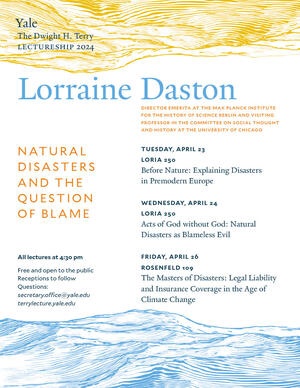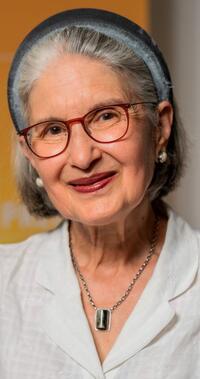 About the 2024 lectures: The idea of the purely natural disaster, for which neither man nor God was to blame, is the Creation of the Enlightenment. This idea lies at the heart of modern metaphysics and ethics: in metaphysics, it drew sharp boundaries between the supernatural, the human, and the natural; in ethics, it posed the quandary of misfortunes that were tragic but nobody’s fault. What happens when we lose the idea of the natural disaster, for which no one is to blame, in the age of anthropogenic climate change, for which everyone is to blame?
About the 2024 lectures: The idea of the purely natural disaster, for which neither man nor God was to blame, is the Creation of the Enlightenment. This idea lies at the heart of modern metaphysics and ethics: in metaphysics, it drew sharp boundaries between the supernatural, the human, and the natural; in ethics, it posed the quandary of misfortunes that were tragic but nobody’s fault. What happens when we lose the idea of the natural disaster, for which no one is to blame, in the age of anthropogenic climate change, for which everyone is to blame? NATURAL DISASTERS AND THE QUESTION OF BLAME
Free and open to the public
Receptions to follow each lecture
Tuesday, April 23, at 4:30 p.m. | Loria 250 | Register
Before Nature: Explaining Disasters in Premodern Europe
Wednesday, April 24, at 4:30 p.m. | Loria 250 | Register
Acts of God without God: Natural Disasters as Blameless Evil
Friday, April 26, at 4:30 p.m. | Rosenfeld 109 | Register
The Masters of Disasters: Legal Liability and Insurance Coverage in the Age of Climate Change
Lorraine Daston
 Lorraine Daston is Director emerita at the Max Planck Institute for the History of Science, Berlin, Visiting Professor in the Committee on Social Thought at the University of Chicago, and Permanent Fellow of the Wissenschaftskolleg zu Berlin. Her work spans a broad range of topics in the early modern and modern history of science, including probability and statistics, wonders and the order of nature, scientific images, objectivity and other epistemic virtues, quantification, observation, algorithms, and the moral authority of nature. She has been awarded the Sarton Medal of the History of Science Society (2012), the Dan David Prize in the History of Science (2018), and the Heineken Prize for History of the Royal Netherlands Academy (2020). Her most recent books are Against Nature (2019), Rules: A Short History of What We Live By (2022) and Rivals: How Scientists Learned to Cooperate (2023). She is a Fellow of the American Academy of Arts and Sciences, a member of the American Philosophical Society, the Leopoldina, and the Berlin-Brandenburg Academy of Sciences, and a corresponding member of the British Academy.
Lorraine Daston is Director emerita at the Max Planck Institute for the History of Science, Berlin, Visiting Professor in the Committee on Social Thought at the University of Chicago, and Permanent Fellow of the Wissenschaftskolleg zu Berlin. Her work spans a broad range of topics in the early modern and modern history of science, including probability and statistics, wonders and the order of nature, scientific images, objectivity and other epistemic virtues, quantification, observation, algorithms, and the moral authority of nature. She has been awarded the Sarton Medal of the History of Science Society (2012), the Dan David Prize in the History of Science (2018), and the Heineken Prize for History of the Royal Netherlands Academy (2020). Her most recent books are Against Nature (2019), Rules: A Short History of What We Live By (2022) and Rivals: How Scientists Learned to Cooperate (2023). She is a Fellow of the American Academy of Arts and Sciences, a member of the American Philosophical Society, the Leopoldina, and the Berlin-Brandenburg Academy of Sciences, and a corresponding member of the British Academy.